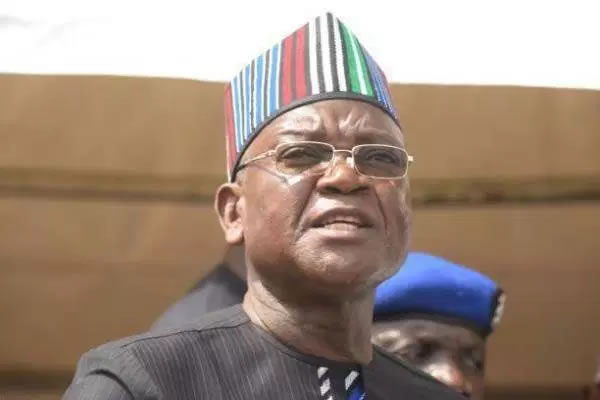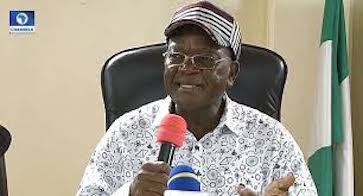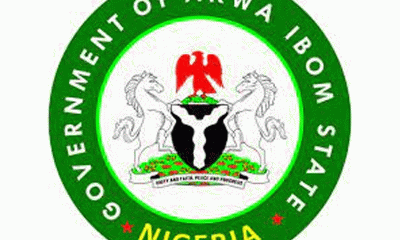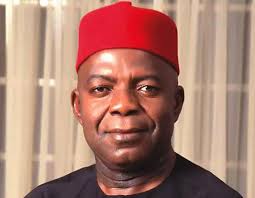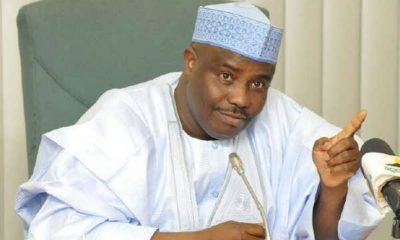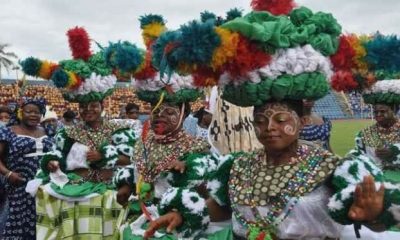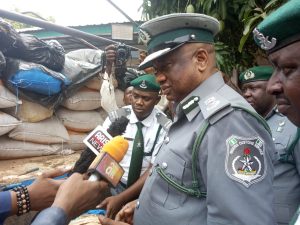OPINION
Miyetti Allah: The Untold Story
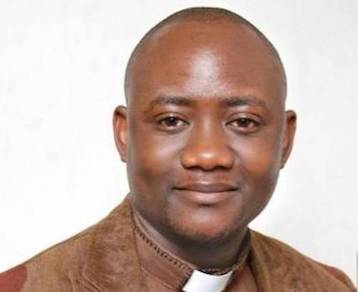
Miyetti Allah: The Untold Story
By Justine John Dyikuk
This writer’s knowledge of Miyetti Allah has simply been that of the Miyetti Allah Cattle Breeders’ Association (MACBAN). Will his perception change? Well, kindly read on to find out.
Headquartered in Kaduna, the organisation was founded in the early 1970s but became operational in 1979. However, it was not until 1987 that the socio-cultural association which represents the interests of almost 100,000 semi-nomads and nomads in Nigeria, gained wider acceptance as an advocacy group across the country.
In the 1970s membership was drawn from Kaduna and Plateau States. Little wonder then, one Muhammadu Sa’adu who was born in Jos but raised in Kaduna headed the organisation. He was strategic in canvasing for new members to populate the body. Although meetings were irregular, they gradually started having branches in other states. Common themes for the Miyetti Allah group include advocacy for nomadic education and acquiring grazing reserves for members since pastoralists like roving about.
In recent years, the association has been in the eye of the storm. This is largely due to the farmer-header conflicts in the Middle Belt Region and other parts of the country. While their cattle are dear to them like an only child, farmers are equally passionate about their farm produce. The impasse between the duo is occasioned by destruction of crops by herders and killing of cattle by farmers which often leads to mutual attacks. Painfully, between 2010 and 2015, reports have that 6,500 lives were lost and 62,000 others were displaced from their homelands in 850 recorded violent clashes between herdsmen and farmers in the Middle Belt Region of the country.
While Miyyeti Allah continues to promote the welfare of Fulani pastoralists, there is an increase in the incidence of farmer-herder conflicts. In the midst of this, from 2011, cattle rustling became a booming business. These unsavory realities have brought an erstwhile unknown group into limelight. As this consciousness makes sense to one group, it is apparently a scum to others that should be discarded. The activities of the dreaded Fulani-killer herdsmen have not helped the narrative.
The provocative statements of some leaders of the association without query has emboldened them and made many Nigerians circumspect of their activities. Perhaps that is why some people easily paint the Fulani race with the same brush.
Unfortunately, the body language of the government has not authenticated the President’s purportedly plagiarized catchphrase during his 29 May 2015 inaugural speech which says: “I belong to everybody and I belong to nobody.” Otherwise, how would be tell Benue people to go home and live in peace with their neighbours as widely reported in national dailies on 12 March 2018? Why would the Federal Government through the Defence Minister, Mansur Dan-Ali blame the killings in Benue on the anti-grazing law which was enacted by the Benue State House of Assembly on 22 May 2017 as reported in Premium Times of 25 January 2018? Was that a response to MACBAN’s plea with the Federal Government, National Assembly (NASS) and international community to intervene in the Anti-Open Grazing Law operating in Benue? The RUGA Policy and Water Resources Bill tells who is the well beloved child in the matter.
Desertification and conflicts have forced Pastoralists from other countries like Guinea, Mali, Burkina Faso, Sudan, Chad, Niger Republic, Cameroun into the country. The porous nature of our borders is an added incentive to these foreigners who may have little or no links with the native cattle breeders except for ancestral linkages.
The statement by the UK House of Lords which raised a red flag on Fulani headers and other Islamic militia who have continued attacks in northern and central-belt states which was dated 14 September 2020 clarified the matter when it said: “We recognize the important distinction between the Fulani in general (a diverse group of millions of people with hundreds of clans) and the sub-group of well-armed, radicalized Fulani who carry out attacks.” Governor Abdullahi Umar Ganduje of Kano State did not throw caution to the wind when he called on the Federal Government to ban the influx of herdsmen from neighbouring countries into Nigeria.
In an editorial titled “The Miyetti Allah provocations” published on 15 June 2020, The Guardian decried that: “Miyetti Allah Kautal Hore, led by Bello Abdullahi, ordinarily a cattle breeders’ association has morphed into the equivalent of a terrorist organisation operating without let or hindrance in the public space.” It also noted that: “Coincidentally, their sense of self-importance has grown in provocative proportions since the Buhari administration took over in 2015.
Apart from threatening other ethnic groups and stakeholders in the country, in a rather vexatious manner, its leaders recently declared that ‘Nigeria belongs to Fulani’ and that the ‘Fulani will rule forever.’” Abdullahi added that his organisation has concluded arrangements to set up its own security outfit of five thousand men to be deployed across all the states of the federation.
In their separate reactions, Muslim Rights Concern (MURIC), Christian Association of Nigeria (CAN) in the 19 northern states and Abuja and Yoruba World Congress (YWC) condemned the remarks, describing them as capable of disrupting the fragile peace of the nation. The Guardian further lamented that:
“So far, there is no indication that the Federal Government has cautioned the group on the volatility of its statements. This is unfortunate in the extreme.” It decried clannishness which has given Miyetti Allah the gumption to utter provocative statements capable of setting the nation ablaze while emphasizing that by contrast, the now proscribed Indigenous Peoples of Biafra (IPOB) did not threaten the unity of Nigeria as much as the former but got python dance.
Recently, I was at Tilden Fulani market in Toro LGA of Bauchi State to buy some food stuffs. While the over 70 years old (from her looks) petty trader was about handing over what I asked for, I saw her giving an item to another woman who graciously answered: “Miyetti Allah.”
I asked her what that meant and with a generous smile she replied: “Nagode Allah” in Hausa which translates as: “Thank you Lord” in English. At that, the other Fulani woman said, “Who wants to learn Fulfulde at a time that Fualnis are the most hated people!” I was taken aback! Well, for me, there are two interesting parts to this story. One, the generosity of the old woman which is highly commendable and two, the other woman’s disturbing statement which raises questions about identity and the perception of a particular ethnic group by others.
Going forward, we need to return to the drawing board. We need to trace where we got it wrong. Our parents and their forebears lived in peace.
The Fulanis were friendly pastoralists who supplied milk and meat to farmers who in turn donated their farmland to the nomads after harvest for the grazing pleasure of their cattle. The truth is, someone is not telling somebody the truth. Unless we wash our bodies off the debris of ethnic coloration and cover up, criminals would continue to feast on an already bad situation.
These two Fulani women in our story reveal how a simple remark which expresses worry about how a certain group of people are stereotyped can initiative discussions leading to peace and reconciliation in our communities and country. Those who hold a single narrative of Miyetti Allah should remember “The Danger of a single story” as Chimamanda Adichie puts it. God bless the Federal Republic of Nigeria!
Fr. Dyikuk is a Lecturer of Mass Communication, University of Jos, Editor – Caritas Newspaper and Convener, Media Team Network Initiative (MTNI), Nigeria.
OPINION
The Pre-2027 Party gold Rush
By Dakuku Peterside
The 2027 general elections are fast approaching, and Nigeria’s political landscape is undergoing a rapid transformation. New acronyms, and freshly minted party logos are emerging, promising a new era of renewal and liberation.To the casual observer, this may seem like democracy in full bloom — citizens exercising their right to association, political diversity flourishing, and the marketplace of ideas expanding.
However, beneath this surface, a more urgent reality is unfolding. The current rush to establish new parties is less about ideological conviction or grassroots movements and more about strategic positioning, bargaining leverage, and transactional gain.It is the paradox of Nigerian politics: proliferation as a sign of vitality, and as a symptom of democratic fragility. With 2027 on the horizon, the political air is electric, not with fresh ideas, but with a gold rush to create new political parties.Supporters call it the flowering of democracy. But scratch the surface and you will see something else: opportunism dressed as pluralism. This is not just politics; it is political merchandising. Parties are being set up like small businesses, complete with negotiation value, resale potential, and short-term profit models. Today, Nigeria has 19 registered political parties, one of the highest numbers in the world behind India (2,500), Brazil (35), and Indonesia (18).History serves as a cautionary tale in this context. Whenever Nigeria has embraced multi-party politics, the electoral battlefield has eventually narrowed to a contest between two main poles. In the early 1990s, General Ibrahim Babangida’s political transition programme deliberately engineered a two-party structure by decreeing the creation of the National Republican Convention (NRC) and the Social Democratic Party (SDP).His justification was rooted in the observation — controversial but not entirely unfounded — that Nigeria’s political psychology tends to gravitate toward two dominant camps, thereby simplifying voter choice and fostering more stable governance. Pro-democracy activists condemned the move as state-engineered politics, but over time, the pattern became embedded.When Nigeria returned to civilian rule in 1999, the Peoples Democratic Party (PDP) emerged as the dominant force, facing off against the All People’s Party (APP) and Alliance for Democracy (AD) coalition. The 2003 and 2007 elections pitted the PDP against the All Nigeria Peoples Party (ANPP); in 2011, the PDP contended with both the ANPP and the Congress for Progressive Change (CPC).By 2015, the formation of the All Progressives Congress (APC) — a coalition of the CPC, ANPP, Action Congress of Nigeria (ACN), and a faction of the All Progressives Grand Alliance (APGA) — restored the two-bloc dynamic. This ‘two-bloc dynamic’ refers to the situation where most of the political power is concentrated within two main parties, leading to a less diverse and competitive political landscape. Even when dozens of smaller parties appeared on the ballot, the real contest was still a battle of two heavyweights.And yet, here we are again, with Nigeria’s Independent National Electoral Commission (INEC) registering nineteen parties but facing an avalanche of new applications — 110 by late June, swelling to at least 122 by early July. This surge is striking, especially considering that after the 2019 general elections, INEC deregistered seventy-four parties for failing to meet constitutional performance requirements — a decision upheld by the Supreme Court in 2021.That landmark ruling underscored that party registration is not a perpetual license; it is a privilege conditioned on meeting electoral benchmarks, such as a minimum vote share and representation across the federation. The surge in party formation could potentially lead to a more complex and fragmented electoral process, making it harder for voters to make informed decisions and for smaller parties to gain traction.So, what explains the surge in the formation of new parties now? The reasons are not mysterious. Money is the bluntest answer, but it is woven with other motives. For some, creating a party is a strategic move to position themselves for negotiations with larger parties — trading endorsements, securing “alliances,” and even extracting concessions like campaign funding or political appointments.Others set up “friendly” parties designed to dilute opposition votes in targeted constituencies, often indirectly benefiting the ruling party. Some political entrepreneurs build parties as personal vehicles for regional ambitions or as escape routes from established parties, where rival factions have captured the leadership.Some are escape pods for politicians frozen out of the ruling APC’s machinery. There is also a genuine democratic impulse among certain groups to create platforms for neglected ideas or underrepresented constituencies. But the transactional motive often eclipses these idealistic efforts, leaving most new parties as temporary instruments, rather than enduring institutions.The democratic consequences of this kind of proliferation are profound. On one hand, political pluralism is a constitutional right and an essential feature of democracy. On the other hand, too many weak, poorly organised parties can fragment the opposition, confuse voters, and degrade the quality of political competition.Many of these micro-parties lack ward-level presence, a consistent membership drive, and ideological coherence. Their manifestos are often generic, interchangeable documents crafted to meet registration requirements, rather than to present a distinct policy vision. On election-day, their presence on the ballot can be more of a distraction than a contribution, and after the polls close, many vanish from public life until the next cycle of political registration. This is not democracy — it is ballot clutter.This is not uniquely Nigerian. In India, a few thousands registered parties exist, yet only a fraction of them is active or competitive at the state or national level. Brazil, notorious for its highly fragmented legislature, has struggled with unstable coalitions and governance deadlock; even now, it is reducing the number of effective parties.Indonesia allows many parties to register but imposes a parliamentary threshold — currently four per cent of the national vote — to limit legislative fragmentation. These examples, along with others from around the world, suggest that plurality can work, but only when paired with guardrails: stringent conditions for registration, clear criteria for participation, performance-based retention, and an electoral culture that rewards sustained engagement over fleeting visibility.Nigeria already has a version of this in place, courtesy of INEC’s power to deregister. We deregistered seventy-four parties in 2020 for failing to meet performance standards, and five years later, we are sprinting back to the same cliff.Yet, loopholes remain especially, and the process is reactive rather than proactive. Registration conditionalities are lax. This is where both INEC and the ruling APC must shoulder greater responsibility. The need for electoral reform is urgent, and it is time for all stakeholders to act.For INEC, the task is to strengthen its oversight by tightening membership verification, enhancing financial transparency, and expanding its geographic spread requirements, as well as introducing periodic revalidation between election cycles.For the ruling party, the challenge lies in upholding political ethics: resisting the temptation to exploit party proliferation to splinter the opposition for short-term gain. A strong ruling party in a democracy wins competitive elections, not one that manipulates the field to run unopposed. Strong democracy requires a credible opposition, not a scattering of paper platforms that cannot even win a ward councillor seat.Here is the truth: this system needs reform. Reform doesn’t mean closing the democratic space, but making it meaningful and orderly. Democracy must balance full freedom of association with the need for order. While freedom encourages many parties, order requires limiting their number to a manageable level.For example, Nigeria could require parties to have active structures in two-thirds of states, a verifiable membership, and annual audited financials. Parties failing to win National Assembly seats in two consecutive elections could lose registration.The message to new parties is clear: prove you’re more than just a logo and acronym. Build lasting movements — organise locally, offer real policies alternatives, and stay engaged between elections.Democracy is a contest of ideas, discipline, and trust. If the 2027 rush is allowed to run unchecked, we will end up with the worst of both worlds — a crowded ballot and an empty choice. Mergers should be incentivised through streamlined legal processes and possibly electoral benefits, such as ballot priority or increased public funding. At the same time, independent candidates should be allowed more room to compete, ensuring that reform does not entrench an exclusive two-party cartel.Ultimately, the deeper issue here is the erosion of public trust. Nigerians have no inherent hostility to new political formations; what they distrust are political outfits that emerge in the months leading up to an election, strike opaque deals, and disappear without a trace. Politicians must resist the temptation to treat politics as a seasonal business opportunity and instead invest in it as a long-term public service.As 2027 approaches, Nigeria stands at a familiar but critical juncture. The country can indulge the frenzy — rolling out yet another logo, staging yet another press conference, promising yet another “structure” that exists mainly on paper. Or it can seize this moment to rethink how political competition is structured: open but disciplined, plural but purposeful, competitive but coherent.Fewer parties will not automatically make Nigeria’s democracy healthier. But better parties — rooted in communities, committed to clear policies, and resilient beyond election season — just might. And that is a choice within reach, if those who hold the levers of power are willing to leave the system stronger than they found it.Dakuku Peterside, a public sector turnaround expert, public policy analyst and leadership coach, is the author of the forthcoming book, “Leading in a Storm”, a book on crisis leadership.OPINION
Call for National Youth Career Development Initiative
By Blessing Adeoti
Nigerian youths are intelligent and hardworking, but very few have a solid career development plan. It doesn’t matter whether a student graduates with first-class honours or shows great potential; most focus on just one goal: earning a degree or certificate from a higher institution and then seeking job opportunities.
The main issues are the lack of available jobs, and nowhere in the world is it necessary for the government to guarantee employment for everyone. Moreover, not every student who attends a higher institution needs to follow such a path.Most people may be better suited to alternative routes, such as technical or vocational training, to develop competent professionals in industries that lack sufficient specialised expertise, including electricians, carpentry, plumbing, welding, mechanics, computer skills, and others. These are skills in high demand that will enable the youth to contribute meaningfully to the economy, even as entrepreneurs.Although President Bola Tinubu’s administration is trying to revive the technical colleges, what orientation do the students have to embrace the unique opportunities? Should we blame the youths for lacking this foresight? No! The root of the problem lies in the absence of structured career counselling in Nigeria’s educational system.Nigerian youths face the challenges of navigating the uncertainty in career pursuits. This is not because they lacked aspirations, but rather due to the near-total absence of a functional career counselling system within the Nigerian education sector. Nigeria’s career counselling vacuum dates to the colonial education system, which was mainly designed to produce clerks, administrators, and workers for the service sector. The focus was never on helping students discover their strengths or guiding them toward career paths that could help them achieve their full potential.After independence, the National Policy on Education of 1977, revised in 2013, mandated the introduction of guidance and counselling services in schools, but implementation has been significantly inadequate. Globally, the economic and job realities have changed. As a university lecturer, I have seen firsthand the struggles many students face, yet not one has ever had experience with a career guide or counsellor.In 2020, the Institute of Counselling in Nigeria revealed that only 15 per cent of secondary schools have functional counselling units, and many of these are staffed by untrained personnel. This neglect has produced a generation of aimless graduates, unemployment, underemployment, and skills mismatches. It signals a disconnect between the education system and the labour market, as graduates are often unprepared for the skills required in today’s economy.Economically, the World Bank estimates that youth unemployment costs Nigeria billions in lost GDP annually. The psychological effects are equally devastating. Career indecision is linked to anxiety, low self-esteem, and depression among young Nigerians, according to a 2021 study from the University of Ibadan, which found that many students trapped in unsuitable career paths experienced significant psychological distress.Socially, this has contributed to increased crime, cultism, extremism and terrorism across the country. Nigeria’s crime rate, ranked 7.28 out of 10 globally, is partly fuelled by jobless youth seeking alternative livelihoods.There is hope for change as President Bola Tinubu’s administration has shown a genuine commitment to supporting Nigerian youth. The President’s Renewed Hope agenda for education, including the Nigeria Education Loan Fund and the revitalisation of Nigeria’s technical and vocational colleges, is commendable.However, these efforts risk falling short without the addition of a well-structured national youth career development programme. There are proven models from around the world that Nigeria can adapt to address this challenge. For example, Finland, renowned for its world-class education system, places a strong emphasis on career guidance.From an early age, Finnish students receive career counselling as part of their school curriculum. Trained career counsellors work closely with students to identify their strengths, interests, and goals. Similarly, Singapore implemented the education and career guidance programme, which aligns student aspirations with workforce needs, helping the country maintain youth unemployment below 5 per cent (Singapore Ministry of Education, 2024).In Australia, the National Career Education Strategy prepares young people for the future of work by integrating career education into the school curriculum, emphasising transferable skills such as critical thinking, problem-solving, and adaptability.President Tinubu’s administration can rebuild Nigeria’s system by launching an aggressive youth career development initiative that ensures the President’s educational reforms translate into tangible outcomes.Such an initiative would equip students with the clarity and direction needed to fulfil both their personal aspirations and national economic needs. This is about giving young Nigerians the tools, confidence, and clarity to chart their career developmental paths.With renewed focus and investment, the government now has a real chance to correct past mistakes and help young Nigerians build brighter, more diverse career futures. There are many ideas for structures that could produce excellent results within a year, but Nigeria needs someone, or a team of passionate individuals, to turn them into reality.I recommend that President Tinubu appoint a special adviser for the National Youth Career Development Initiative to avoid the unnecessary bureaucracy that slows down many good initiatives. The special adviser must be an innovative thinker, a visionary leader with empathy and a deep understanding of Nigeria’s youth and job market dynamics, and a passion for empowering the next generation.The candidate would advise the President on a viable initiative for a national youth career development programme and work with other stakeholders. The government must take the lead by prioritising career counselling in its education policies and enforcing the establishment of functional guidance units in all schools.Dr Adeoti writes from Hong Kong via badeoti3@gmail.comOPINION
A Tale of Two Reforms: Why Nigeria Must Not Blink
By O’tega ‘The Tiger’ Ogra
Economic reform is never painless. Every nation that has had to correct profound distortions has faced the same choice: take the hard medicine early, or delay and pay much more later. In times of public frustration, it is tempting to reach for the “gentle” option (the idea of gradual change), being pushed by some opposition elements in Nigeria, begins to sound reasonable.
Peter Obi says, “Keep subsidies for a while. ” For Atiku Abubakar, it is “Guide the currency quietly from behind the curtain.” Rotimi Amaechi and Nasir El-Rufai want to “Push the tough structural work into another year.” On the surface, it feels safer. But history is clear on where that road leads.When Bulgaria began its transition from communism in 1990, its leaders were afraid of the shock that rapid liberalisation might cause. They freed some prices but kept politically sensitive subsidies in place, just as Peter Obi proposes.The subsidies drained the treasury, fuelled inflation, and collapsed the currency. They maintained a soft peg for the lev without reserves to defend it, exactly as Atiku Abubakar suggests for the naira. The peg broke, reserves vanished, and hyperinflation soared above 2,000 percent.They warned against “too much at once,” echoing Rotimi Amaechi and Nasir El-Rufai, and delayed the restructuring of state enterprises. Six years later, pensions were worthless, shops were empty, and the reforms they feared were forced on them in far harsher form.Nigeria today is on a very different trajectory. From his first day in office, President Bola Ahmed Tinubu took on the biggest distortions head-on. The petrol subsidy, which drained over four trillion naira a year, is gone.The naira now trades at a market-driven rate, closing the damaging gap between official and parallel exchange rates. The Central Bank has returned to orthodox monetary policy, raised interest rates to fight inflation, and cleared more than seven billion dollars in verified FX backlogs that had become a national credibility problem.That clearance restored credibility to our financial system and prompted the International Air Transport Association to remove Nigeria from its list of countries blocking airline funds. That reversal matters because it signals to every global balance sheet that Nigeria pays its obligations again.These decisions have delivered measurable wins in record time. The World Bank estimates subsidy savings of around two trillion naira in 2023 alone, with cumulative savings expected to exceed eleven trillion naira by 2025. This money is already being channelled into infrastructure, healthcare, and targeted social programmes across the country.Portfolio inflows in the last quarter of 2024 hit 5.6 billion dollars, more than the total of the previous two years combined and a clear sign that rule clarity is drawing money back to local assets. Non-oil tax revenue has grown by more than twenty percent year-on-year.Price pressure remains the public’s sharpest pain, but the first signs of relief are appearing. Official data show headline inflation eased in June 2025 from May, the first back‑to‑back moderation in many months. Disinflation never arrives in a straight line. What matters is direction and credibility of policy. Both are moving the right way.Yet this is the stage when voices, mostly driven by parochial interest, will call for a pause. Some will say households need breathing space and subsidies should return in another form. Others will argue that the naira is too weak and should be fixed at a stronger rate. There will be calls to slow fiscal clean-up until “conditions improve.” The bandwagon Association of Displaced Politicians, and the economists they front, want us to go back to Bulgaria 1990.Atiku Abubakar’s “acceptable rate” is the same illusion that emptied Bulgaria’s reserves and shattered its peg. Peter Obi’s “phased removal” is the same phased lie Bulgaria told itself until the economy collapsed. Nasir El-Rufai’s warning about “too much at once” is exactly what Bulgaria’s leaders said before the crash.Rauf Aregbesola’s “prioritise the people before the economy” mirrors Bulgaria’s fatal separation of the two, where the collapse of the economy destroyed the very livelihoods they claimed to protect – as if the economy is not the lifeline of the people. Rotimi Amaechi’s call to slow down is the same thinking that turned hardship into collapse.These are not alternative strategies. They are invitations to failure. They are the comfort-now, crisis-later prescriptions that have failed every country that tried them. And in every country where this happened, the politicians who sold them were gone by the time the bill arrived.The same politicians who had their turn in power and left Nigeria with a broken FX regime, ballooning subsidies, and a dangerous debt overhang now want to lecture about “protecting the people” by bringing back the very distortions that were killing growth. That is not protection. That is sabotage dressed as sympathy.A soft peg without deep reserves burns credibility while draining scarce foreign exchange. Partial liberalisation keeps the price distortions that breed shortages and arbitrage. Delaying the clean-up of state owned enterprises only compounds losses and pushes the real costs into the future.Once you retreat from hard reforms, investor trust evaporates, deficits swell again, and the cost of borrowing climbs. The longer you wait, the fewer options remain when the next shock comes. And when that bill finally arrives, it is always larger than it would have been if settled early.We have seen this film before. In 1990 Bulgaria called it gradual reform. By 1996, pensions were worthless, shops and shelves were empty, and the same politicians who promised a soft landing had fled the wreckage. The dire situation in.Bulgaria forced a desperate rescue the following year under conditions far harsher than anything they had wanted to avoid. I confidently repeat that, in Nigeria, those pushing this fantasy today will not be around to clean up the mess tomorrow. The only question is whether we have the discipline to finish the job or whether we hand the steering wheel back to the people who drove us into the ditch in the first place.Nigeria is not Bulgaria in 1990. We will not drift toward collapse because a few familiar names prefer popularity over responsibility. The alternative is to hold the line and let the compounding work in our favour. Clean our books and keep the auction rulebook predictable.Keep subsidy savings transparent and tied to visible projects so citizens can see where the money now goes. Keep monetary policy tight until inflation is back within a credible band and do not second‑guess the float with administrative fixes that markets will immediately punish.The IMF’s recent assessment underscored that Nigeria’s policy direction restores repayment capacity and anchors stability if pursued consistently. That is the quiet endorsement that disciplined reformers earn.Because this debate will not end here, it is worth meeting the counter‑arguments head on. Some say the pain on households is too high and too fast. The truth is the subsidy was never free. It was paid through bad roads, weak schools, failing hospitals and heavy borrowing that our children would service. Redirected savings are how you rebuild those services.Others say the float has made the naira too weak and that we should fix it at a stronger number. A number without reserves is only a promise. Markets test promises. Bulgaria failed that test in 1990 and paid for it in 1996. Nigeria should not repeat it.Another claim is that investors are not yet flooding in, so reforms are not working. They rarely flood in at the start. They watch for consistency, then move quickly. The late‑2024 surge in portfolio inflows is exactly that early signal. Hold the line and the longer term money follows.But as Mr President has always said and I am fully aware, Nigeria’s path is not without discomfort, but it is the only one that gives us a fighting chance to rebuild. The facts of upward, positive change are not in dispute.It is already producing the first signs of stability and renewed investor interest. The trajectory, if we hold it, leads to a competitive and credible naira, a fiscally stronger state investing in power, roads, and schools instead of fuelling petrol imports, and an economy where capital flows in because the rules are predictable and the numbers add up. Growth will no longer be hostage to oil prices alone, and the non-oil revenue gains of the current and past year are the proof.The opposition has shown that they have chosen collapse. Some former allies have joined them. The rest of us must hold the line. History has already written the ending for the road they want. We have chosen a different ending.There is no painless exit from decades of distortion. The choice is as stark as it is simple. Pain now with a recovery you can see, or comfort now with a collapse you cannot control. Bulgaria 1990 is the warning. Nigeria 2023 is the opportunity. We are already making in months the progress that took years for countries in similar positions. If we keep our nerve, stay transparent, and refuse the detours that have failed elsewhere, we will not just avoid Bulgaria’s trap. We will write the modern African recovery story others will study.And this is the truth we must hold to. The easy road has never led any nation to greatness. What we are doing under President Bola Ahmed Tinubu is hard, but it is necessary. We will be judged not by how loud the complaints were in the first year, but by the strength of our economy in the fifth and thereafter. If we see this through, the same Nigerians who today feel the sting will one day stand as proof that under President Bola Ahmed Tinubu, Nigeria chose courage over comfort, and that choice changed the destiny of our nation for good and forever. And if we have the discipline to finish this path, it will be the one in which Nigeria wins.The Tiger’s Final Take: The Koko of the MatterBulgaria’s 1990 reforms teach us that gradualism in the face of structural crisis is not kindness. it is negligence in slow motion.Nigeria’s current path under President Tinubu is the opposite. It is tough, urgent, and forward-looking. If we hold this line, the discomfort will give way to resilience, competitiveness, and prosperity.Nigeria’s reforms today are closer to Bulgaria’s 1997 reset which is the one that finally worked, rather than to its failed 1990s drift. The difference is that Nigeria is doing it before hitting hyperinflation or a currency collapse.It is the hard road, but it is the right road, and it leads upward. This is the best time to Bet on Nigeria.A fellow of the Chartered Institute of Marketing (UK), O’tega ‘The Tiger’ Ogra is the Senior Special Assistant to President Bola Tinubu of Nigeria on Digital Communications, Engagement, and Strategy.


